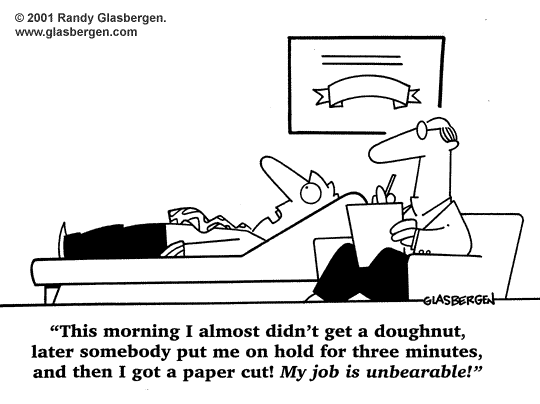
OK, so you might be thinking this is a nonsensical question. I mean, after all, it's pretty simple, right? We all want to go to work and like what we do.
But if it were that easy to accomplish, everyone would achieve it. The problem, as usual, lies in the application.
Everyone knows what they want (or what they don't); they just don't know how to get it.
Spend a minute, if you will, in my shoes...a resume writer/career coach who works with job seeker after job seeker, all essentially in the same quest: to like their job. The mantra is always the same: "I just want to like my job." They are clear as day on that. No bones about it.But when you ask them what it means "to like your job," it's like you asked them what is the secret to happiness.
(Hey, maybe that is the real question here anyway!)It's a rare few who can really answer it much beyond the "I want the pit in my stomach to go away" or "I want to look forward to going there every work day."
Yet when you press them to tell you what it would take to make that happen, most of the responses/issues they respond with are about circumstantial things, not necessarily about job-related things. For instance, for many people, it is co-worker stuff or boss stuff or commute and work-life stuff. It's rare that it is the job itself.
Now, that isn't to say that these issues aren't important or real, but in my mind, there is a difference between the "job" and the circumstances that surround it. That may be splitting hairs for some, but to me, it is important to recognize in deciding whether you are making a reactive decision to leave or a proactive one, much less whether you need a complete career overhaul or just a change of venue (or maybe attitude!).
I've witnessed people make life-changing career changes over a bad boss. I've watched careers stagnant over an unwillingness to find a compromise with a co-worker. And none of it really had to do with whether they liked the specific job itself, but all of it shifted the person's perception of his or her work situation.
In my mind, there's a similarity here with the process of finding the "right" house. If you've watched even one episode of HGTV (House Hunters, Property Virgins, etc.), you know that there really is no such thing as the "perfect" home. Houses are a lot of work, no matter what your price point. Buy it new today; tomorrow it is old, etc. They all need maintenance. They all have locations or neighbors or taxes or environmental challenges that have to be overcome, and you as the purchaser must decide what you are willing to live with (or maybe more importantly, without). Jobs are no different.
And like jobs, you can bounce from house to house, trying to find the perfect one, but it is expensive and time-consuming, not to mention stressful and often counterproductive. No one likes to move, especially the older you get and the more you accumulate. Lugging all that baggage with you each time gets, well, tiring, and who's to say really that the new place will provide that "like" factor you are looking for (or for how long)? How do you know you aren't just swapping one problem for another?
So am I saying a person should never leave a job (or a house) just because he or she doesn't like the circumstances around it?
No. Of course not. I am saying, though, that you need to find a way to assess what is really motivating you. Understanding that can help you to make a better first step in trying to overcome the problem.The other issue you need to look at is what priorities you have placed on whether you like a job. Is it the job that really matters or the benefits? For instance, have you decided that security, health care options, commute time, work-life balance, etc. all matter more than whether you like the actual job itself? (I know...you want all of it...who doesn't!) Again, I am not saying these things don't matter, but to get to the root of your dissatisfaction, you need to understand what is motivating you to move on.
If you resolved just one or two of those circumstances, would that be enough to make you like what you do?
Maybe the bigger question is as follows: What if you couldn't resolve any or most of the circumstantial issues surrounding your job? Are you just destined to hate it then?
When it comes down to it, a lot of what makes us like something has to do with the hope we have in it.
Do we see a future that looks promising? Can we see beyond the irritations of today to a longer term goal? Are we willing to look past the temporal to something more concrete (e.g., can we leave behind a legacy with the job that we do)? Focusing on these things, instead of on the here and now, that is what truly brings in the long-lasting like factor because it shifts from things we can't control to things we can. In my opinion, whether a person likes his or her job often has more to do with how in control he or she feels about the future. (Ask yourself: Am I letting the circumstances control my job future...or am I calling the shots?)But you have to be willing to shift that focus. Are you? After all, often we forget that having a job you love really starts with, well, you.
No comments:
Post a Comment